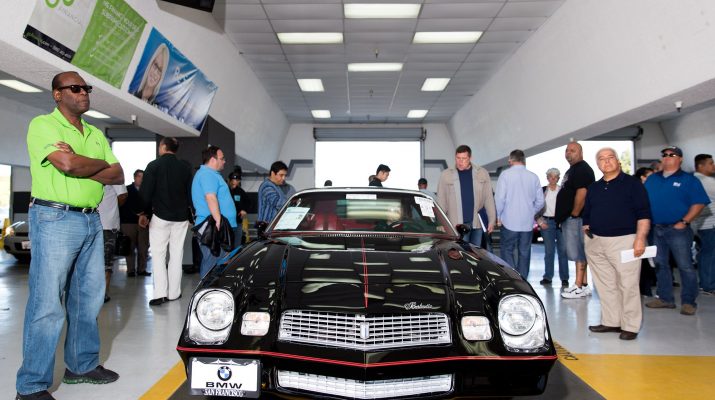Buying a car at auction can be a scary thing. There’s no warranty involved, almost always no return policy, and many other variables. But sometimes, it’s the best option available. If you find yourself in a situation like that, follow these 10 steps to make sure you end up with the car you’re expecting.
- Be Honest with Yourself
If you don’t have the ability and tools to deal with whatever mechanical challenges may arise, don’t talk yourself into believing otherwise. If you’re looking for cheap transportation, don’t let it become expensive repairs.
- Use Your Eyes
Cars at government and public auctions sell on visual inspection alone. So, look for signs of repairs such as paint overspray, less than smooth sheet metal, puddles under the vehicle, scored brake discs, an uneven stance and a million other details. Use your nose, hands and legs, too. If a car smells musty or the carpeting is wet, run away.
- But Don’t Believe Everything You See
Bondo, polish and touch up paint are cheap. Particularly at public auctions, assume every vehicle there has been rubbed on to the point that there’s a reality distortion field surrounding it. Nothing is as good as it looks.
- Don’t Let the Superficial Scare You… if You’re at a Government Auction
At government auctions, weathered paint may cover a mechanically sound Crown Victoria. A small dent in the tailgate of a Chevrolet Silverado may just be a parking lot thump, not signs of misuse. At public auctions, however, those may mean the car is such a basket case that no one thought it was even worth the effort to try and fool people.
- Check the VIN
Write down the VIN from the base of the windshield for any car you’re considering. Then check other places where the VIN might appear, such as door and trunk lid stickers. If the numbers don’t match, the car may have been in a major accident and rebuilt. Look for more promising alternatives.
- Pull the Dipsticks
If a car has been well-maintained, when you pull the oil or transmission fluid dipsticks the lubricants should be clear and clean.
- Know Car Values Before You Bid
Online resources such as Kelly Blue Book and Edmunds give a general idea what used cars are worth. But also take time to research local prices on Craigslist and in classified listings. Again, pride works against you here. If you don’t know about car values, don’t try and fake it.
- “As Is” Means “As Is”
Vehicles at auction sell in “as is” condition. That means there are no guarantees, no warranties and no means of legal recourse. If you don’t have the stomach to survive discovering you’ve bought a heap of trouble, don’t bid in the first place.
- Observe Other Bidders
Take time to watch the action closely on all the cars up for auction. Look for suspicious actions such as bidders who seem to be active on every lot; they may just be trying to pump up the prices. Go to a few auctions before participating in one yourself. Get to know the players.
- Don’t Get Caught Up in the Bidding
It’s easy to get carried away during bidding and wind up spending hundreds more than a car is worth. Don’t pin all your hopes on one vehicle. Be ready to walk away. If you must take the bus home afterward, it’s still better than winding up with a clunker.


